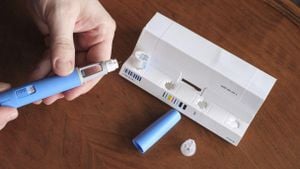It might sound funny, but hair seems to grow quickly where we least want it—think toes, pits, and other bits—but growing it on our heads? That can feel like watching paint dry. Whether you're dealing with post-trim sadness or the frustration of flaky strands just grazing your shoulders, you’re not alone. Many people are turning to seemingly magical products claiming to boost hair growth, only to feel let down when their wallets are lighter, and their hair remains the same. The challenge is, how do you know what's hype and what's real, especially when so much information is out there?
Experts agree: much of successful hair growth boils down to genetics and lifestyle choices. To help navigate the vast sea of information, we consulted leading hair specialists to separate fact from fiction and provide strategies to speed up your hair's growth.
According to Anabel Kingsley, one of the UK’s top trichologists and the brand president at Philip Kingsley, the average hair growth rate is about half an inch every month, which translates to around six inches, or 15 centimeters, annually. But don’t get too excited; everyone’s growth rate varies based on numerous factors.
Hair growth isn’t about instant cures, so beware of products promising overnight changes. "There are definitely effective treatments,” says Kingsley, “but I wouldn’t call them ‘miracles’. You need to give them time—at least six weeks to see any results, and noticeable changes might not kick in until around the three-month mark.” A thorough grasp of the hair growth phases helps here. The follicle goes through cycles of growing (anagen), transitional (catagen), resting (telogen), and finally shedding (exogen). Keeping track of these stages can help manage expectations.
One size doesn’t fit all when it boils down to hair treatments. Factors like diet, nutritional levels, hormonal fluctuations, overall health, and even stress can all influence how quickly or healthily your hair grows. Therefore, experts suggest identifying the areas needing improvement. Tweaking your diet to include nutrient-rich foods can be beneficial.
While there’s no miracle cure, the one treatment backed by research is minoxidil (often known as Regaine), which is clinically proven to promote hair thickness and growth for both men and women facing pattern baldness. This medication, though, is only suitable for those with specific types of hair loss.
Hair is deeply affected by lifestyle choices. Factors like smoking, excessive alcohol consumption, and diets high in sugar can all create issues for your scalp. Hair is actually considered non-essential tissue, meaning it’s often the first to suffer when your body lacks nutrients due to dieting. "Restrictive eating can lead to hair shedding,” warns Kingsley, emphasizing the need to monitor your dietary intake.
How you wear your hair can also have consequences. For example, those tight ponytails you love might be causing traction breakage, pulling hairs right out of their follicles. So, looser styles might be the way to go if you’re fond of your hair’s integrity.
To promote healthy hair, it's critical to focus on overall health. Kingsley's mantra? "The healthier you are, the healthier your hair will be." Understanding the nutritional components of your diet is key here. Hair is made up of 97 percent protein, so ensuring you consume ample protein through foods like fish, lean meats, or plant-based options is fundamental.
Dietary adjustments can make all the difference. Consuming at least one palm-sized portion of protein at breakfast and lunch and including complex carbohydrates—like brown rice or whole-wheat products—at each meal will provide the energy hair needs for optimal growth. After all, hair cells are among the fastest-growing cells the body has, second only to bone marrow.
While expert nutritionists stress the importance of healthy eating over supplements, they aren’t entirely dismissive of them. If your diet lacks certain nutrients, supplements can effectively fill those gaps. When searching for supplements, look for those containing protein, iron, zinc, biotin, and omega-3 fatty acids. Kingsley notes, "Biotin plays a major role because it aids the synthesis of hair proteins like keratin—the building block of healthy hair.”
Before jumping on the supplement train, consulting with your healthcare provider is wise. A checkup might recommend blood tests to highlight any deficiencies. A well-balanced diet should be the groundwork of any hair health plan.
One often overlooked aspect of hair growth is the importance of sleep. Stephen Carson, another esteemed trichologist, notes, "Quality sleep is critical for your body to recover and repair itself. If your life is stressful, ensuring you get enough sleep becomes even more important.” {
But what if you just can’t give up those regular trims? Good news! While they don’t make your hair grow faster, they can certainly improve its appearance. Regular trims help maintain density and quality, stopping split ends from causing your hair to look thinner than it really is.
To keep your hair growing strong, experts recommend trimming every six to eight weeks as you might want it shaped and fresh during your growth process. Not only will it remove older ends, providing better health for your hair, but it will also prevent breakage from high wear on the oldest sections.
Of course, hair health goes beyond diet. Maintaining a healthy scalp is equally, if not more, important. Regular shampooing eliminates dirt, debris, and pollutants, thereby optimizing the growing environment of your scalp. So when you shampoo, really take your time; massaging the scalp nurtures blood circulation, delivering oxygen and nutrients to hair follicles. Plus, you might just find it feels fantastic!
Periodically exfoliating your scalp can be another beneficial addition to your routine. Using products meant for exfoliation, rather than just shampoo, can help remove dead skin and prevent clogged follicles, which can impede hair growth. Finding the right balance is key though—over-exfoliation can lead to irritation instead of improvement.
Aside from natural treatments, be mindful of the impact of styling tools on your hair as well. High-heat tools pose risks—irrespective of how often you might need them. Overhearing your hair can cause significant damage: basically, once your hair is dried out, the chances for recovery lessen. If you use heat tools, invest in quality heat protectants, and, if possible, adopt air-drying techniques as much as you can.
The hair dyeing and coloring process can be transformative for many, yet it’s another area where care must be emphasized. To minimize damage and maintain health, seek out professional salons rather than at-home kits—or at least consult with color experts before taking the plunge.
All said, the best part is you have control over numerous aspects of hair health. Simple changes combined with expert-backed strategies can steer you back on the right course. Starting with your diet and lifestyle, fine-tuning your hair care routine along with regular maintenance can keep your strands happy and healthy.
Good hair days aren’t just about the hair products you use; they morph from the inside out. Understanding how your body, choices, and lifestyle affect your hair’s health can pave the path forward for achieving the head of hair you’ve always wanted. So take heart—and take these expert tips to heart—as you continue your hair growth adventure!



